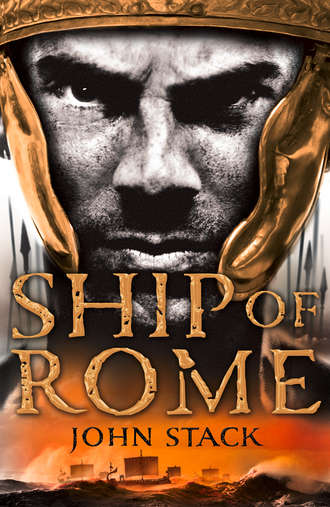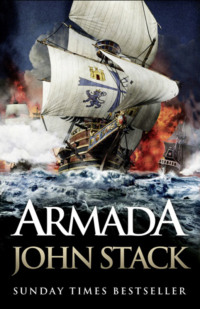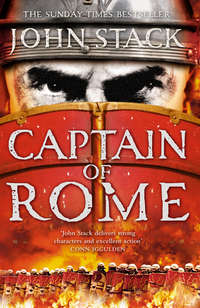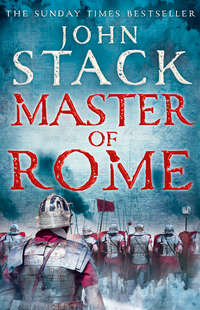
Полная версия
Ship of Rome
The voice in his head roared in rage and fear, ‘Take them, not me. Kill them but spare me—’
His silent cries were cut short by the sight of the ram swinging around to centre itself on the exposed hull of the Onus.
Gisco cursed as the Roman barge broke off her line to a head-on collision. He was standing firm on the aft-deck of the Melqart, his whole body tensed in anticipation, his mind locked on the thought of the bronze ram sinking deep into the bow of the transport barge, a near-suicidal blow that would rock both ships to their cores. He took precious seconds to react to the unexpected reprieve before his mind roared at him to take action.
‘Hard to starboard! Ram amidships!’
The Melqart swung immediately onto its final course, the oncoming wind-driven waves breaking over the ram.
The quinquereme struck the transport barge at a speed of thirteen knots, the six-inch squared blunt nose of the bronze ram splintering the oaken hull of the barge, the momentum of the ninety-ton galley driving the point deeply into the bowels of the larger ship. The force of the impact was absorbed by the keel of the galley, but the sudden loss of speed caused the rowers to lose all coordination and the Melqart came to a complete stop.
‘Archers!’ Gisco roared, and immediately ignited, resin-soaked arrows flew from the main deck of the galley to target the enormous mainsail of the stricken barge. For a second nothing happened, the arrows seemingly ineffective, then small flames appeared as if from nowhere on the huge canvas of sail. The flames held and then exploded as they began to consume the sail.
‘Withdraw!’
The orders to the slave deck were concise and well practised and the Melqart slowly reversed, her ram withdrawing from the mortally wounded ship, the water rushing past it into the gaping hole below the waterline.
‘Cut her down!…For the love of Fortuna cut her down before it spreads!’ Melus roared as he watched the fire grow from the corner of the great sail. Within seconds it began to engulf the entire canvas, the flames licking and then igniting the running rigging and mainmast. The crew of the Onus had been drilled many times in the training that now controlled their actions, their fear of fire fuelling their haste, their bare feet running along the timber deck that the fire above them so desperately craved.
The fire continued to consume the sail, its appetite fed by the trailing wind and, even as Melus watched, the first fiery sections began to fall to the deck. The men attacked the fallen canvas with fanatic hostility, beating the flames with water-soaked cloths. One man screamed as a burning section of canvas fell on him, igniting his hair and clothes, and he ran aimlessly across the deck before falling over the side rail.
The deck heeled violently as the Carthaginian galley withdrew her ram and many men fell on the inclined main deck. The entire sail was now aflame and the falling burning pieces overwhelmed the futile efforts of the crew. Melus looked past the burning main deck to the Carthaginian galley. She was resuming her course to the remaining transport barges behind the Onus, her crew cheering at the sight of the sinking Roman ship.
Melus held on to the tiller tightly as the deck continued to heel over under his feet, the Onus sinking rapidly by the bow. Bitter tears ran freely down his face as shame consumed him, shame for his cowardice, of calling down damnation on his fellow sailors in a bid to save his own life. A rage of frustration and regret overwhelmed him, for he knew he should have stayed on his collision course. The result would have been the complete destruction of the Onus, but Melus now realized their fate had been sealed the moment they sailed from Brolium only hours before. By turning his ship he had lost his only chance to exact some revenge from the Carthaginians for the destruction of his ship and crew, his only chance to send some of the enemy ahead of him to Hades.
The Melqart increased to attack speed as the helmsman sought out another target. Gisco looked around him at the carnage wrought by his fleet of twenty galleys. Some of his galleys were chasing barges as they attempted to break from the pack and escape, while others had sailed directly into the centre of the transport fleet, causing panic and collisions as they snapped at the heels of the larger vessels.
Gisco saw a knot of men in the sea ahead: Romans who had jumped from a burning vessel. They were keeping together, helping each other as their ship slipped beneath the waves not twenty feet away.
‘Helm, one point to starboard!’ Gisco ordered, the helmsman immediately seeing the intended target. He lined up the Melqart perfectly.
The ninety-ton galley bore down on the knot of men, one of their number suddenly seeing the approaching galley, his cries alerting the others. Hamilcar watched the enfolding scene without comment, despising the brutality of targeting helpless men in the water. Like all on board he had cheered as the Melqart had made her first kill, revelling in the destruction of the enemy fleet, praising Tanit, the Phoenician goddess of fortune, for the incredible stroke of fate that had delivered the Roman fleet into their hands.
The frantic pleas of the Romans were cut off as the Melqart struck, many of the archers on the aft-deck running to the stern rail, hoping for survivors. There were none. Hamilcar found himself watching Gisco as the admiral stared at the broken bodies of the Romans in the wake of his ship. He marvelled at the duality of the commander. He was an incredible seaman, the perfection of his trap and his ability to understand and outwit the Roman enemy testament to his skill. But he was also capable of incredible brutality, a burning, insatiable blood lust that demanded a heavy price from the enemy.
Hamilcar recalled the brief of his appointment, a shadow to extend the reach of the Council of Carthage to ensure there was no repeat of Gisco’s ignominious defeat at Agrigentum. It was a course that Hamilcar had often secretly questioned, wondering why Gisco had been allowed to retain his command. Only now, in the heat of battle, did he fully understand the Council’s logic. If Rome was to be defeated in Sicily, men with Gisco’s ruthlessness would be needed in every battle. In all its five-hundred-year history, Carthage had never relinquished a dominion to any enemy. Sicily could not become an exception.
Конец ознакомительного фрагмента.
Текст предоставлен ООО «ЛитРес».
Прочитайте эту книгу целиком, купив полную легальную версию на ЛитРес.
Безопасно оплатить книгу можно банковской картой Visa, MasterCard, Maestro, со счета мобильного телефона, с платежного терминала, в салоне МТС или Связной, через PayPal, WebMoney, Яндекс.Деньги, QIWI Кошелек, бонусными картами или другим удобным Вам способом.






